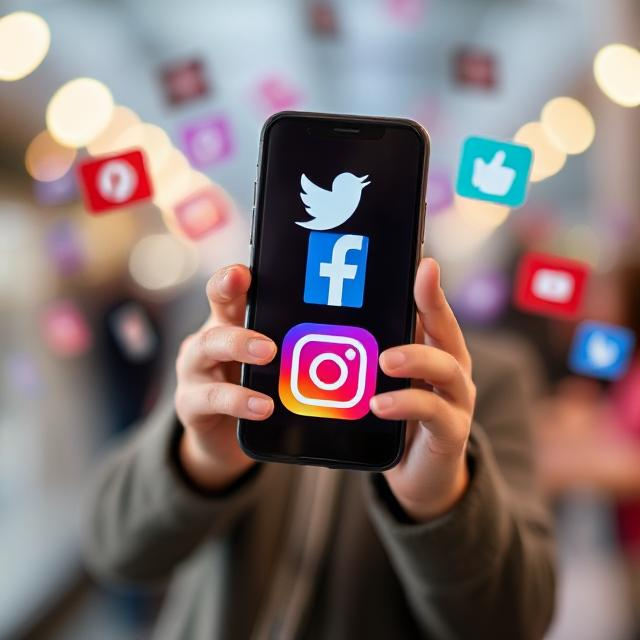In today’s digital age, social media has become an integral part of daily life for billions of people around the world. While it offers opportunities for connection, creativity, and information sharing, there are increasing concerns about its effects on mental health. In this article, we will explore how social media impacts mental well-being, both negatively and positively, and examine the growing body of research on the subject.
Negative Effects of Social Media on Mental Health
1. Increased Anxiety and Depression
One of the most significant concerns is that social media use can lead to increased feelings of anxiety and depression. Constant exposure to curated content, where others’ lives often seem perfect, can lead to negative self-comparisons. People may feel inadequate, stressed, or anxious as they try to meet unattainable standards set by influencers or celebrities. This sense of isolation and low self-esteem can contribute to mental health challenges, especially among teenagers and young adults.
2. Cyberbullying and Online Harassment
Social media platforms can provide a space for bullying and harassment. The anonymity offered by these platforms often leads to negative behavior, including trolling and cyberbullying. Victims of online abuse may experience feelings of worthlessness, shame, and fear, which can contribute to mental health problems such as depression and anxiety.
3. Addiction and Sleep Disruption
The addictive nature of social media, with constant notifications and updates, can interfere with daily life. People often feel compelled to check their phones repeatedly, which can interfere with sleep patterns. Poor sleep, in turn, can exacerbate mental health conditions such as depression and anxiety. Social media addiction can also lead to feelings of disconnection from the real world, contributing to loneliness.
4. Decreased Face-to-Face Interactions
While social media allows for virtual connections, it often leads to a reduction in real-life social interactions. Spending excessive time on social media can isolate individuals, leaving them without the emotional support they need from family and friends. This lack of physical social interaction can increase feelings of loneliness, leading to mental health challenges.
Positive Effects of Social Media on Mental Health
1. Connection and Support
On the positive side, social media has created new avenues for people to connect with others who share similar experiences. Online communities centered around mental health issues, for example, allow people to share their struggles and find support. This sense of community can be especially beneficial for individuals who feel isolated due to their mental health challenges or geographical location.
2. Awareness and Education
Social media has been instrumental in raising awareness about mental health issues. Through posts, articles, and campaigns, it has helped reduce the stigma surrounding mental illness and provided people with resources and information about seeking help. Platforms like Instagram, Twitter, and YouTube host influential advocates who share their personal stories and promote mental health education.
3. Self-Expression and Creativity
Social media also provides a platform for self-expression and creativity, which can have therapeutic effects. For many individuals, posting content such as artwork, writing, or videos can be a form of self-care, helping them process their emotions and express themselves in ways they might not be able to offline.
Research and Statistics on Social Media's Impact on Mental Health
A growing body of research suggests that social media use is linked to both positive and negative mental health outcomes. According to a study published in JAMA Psychiatry (2019), excessive social media use can lead to a higher risk of depression, especially among young people. However, other research highlights the potential benefits of social media, particularly when it is used to create positive connections and raise awareness about mental health.
Statistics show that the average teenager spends between 3-9 hours on social media daily, with a significant proportion reporting feelings of sadness and loneliness. However, a counter-study found that social media use can improve well-being when users engage in supportive and uplifting communities.
How Social Media Affects Mental Health Awareness
Social media has played a crucial role in spreading awareness about mental health issues, often bringing attention to previously overlooked conditions. Campaigns such as #BellLetsTalk and #MentalHealthAwarenessMonth have used social media platforms to spark global conversations about mental health. These movements have encouraged people to share their personal stories, educate others, and advocate for better mental health services and support.
The Role of Social Media in Mental Health Research
The rise of social media has also opened up new avenues for mental health research. Studies now track how social media content affects users’ moods and emotions in real-time. Additionally, researchers have used social media platforms to conduct large-scale surveys and gather data on mental health trends across different demographics. This research has allowed scientists and health professionals to gain deeper insights into the complex relationship between social media use and mental health outcomes.
In conclusion, social media's impact on mental health is multifaceted, with both negative and positive effects. While overuse of social media can lead to anxiety, depression, and social isolation, it can also provide opportunities for connection, support, and increased mental health awareness. As social media continues to evolve, it is essential for individuals to be mindful of their online habits and for society to prioritize mental health education. With the right balance and support, social media can become a powerful tool for fostering positive mental well-being.
Ultimately, more research is needed to fully understand the long-term effects of social media on mental health. As we continue to navigate the digital world, it is important to consider how these platforms shape our emotional and psychological well-being, both for better and for worse.




.png)
0 Comments